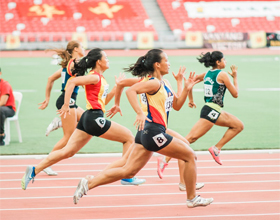
The International Olympic Committee has made an unprecedented commitment to supporting the mental health of elite athletes, with guidance from researchers at Orygen, The National Centre of Excellence in Youth Mental Health.
Orygen’s Associate Professor Rosemary Purcell and Dr Simon Rice were the only Australian co-authors of the world-first document – Mental health in elite athletes: International Olympic Committee consensus statement – which was published yesterday in the British Journal of Sports Medicine.
Associate Professor Purcell, Orygen’s director of research, said it was the first time a group of experts in mental health and sports medicine had come together to review the evidence on mental health issues and treatments in elite athletes.
“We found that the prevalence of mental health symptoms and disorders ranged from around one in five (19%) for alcohol misuse, while as many as one in three elite athletes (34%) experienced anxiety or depression,” Associate Professor Purcell said.
Dr Rice said the work aimed to fill a significant gap in athlete support networks.
“Most elite athletes have doctors, physiotherapists and nutritionists, but they don’t always have access to appropriate mental health support,” Dr Rice said.
Dr Rice added that better mental health support could help improve athletes’ performance both on and off the field.
“If we had better mental health supports in place for our athletes at the elite level, sub-elite level and community level, we’d start to see greater career longevity, and potentially support their role as ambassadors for sport,” he said.
The IOC statement found that one of the greatest risk factors for mental ill-health in elite athletes was injury.
“Mental health cannot be separated from physical health, as evidenced by mental health symptoms and disorders increasing the risk of physical injury and delaying subsequent recovery,” it stated.
“The IOC has committed to improve the mental health of elite athletes, recognising that doing so will reduce suffering and improve quality of life in elite athletes and serve as a model for society at large.”
Associate Professor Purcell said the Orygen researchers would continue to work with the IOC consensus group to improve mental health outcomes.
“Over 10 years ago the first expert consensus statement on concussion in sport was produced. Now, when you see a player concussed in football, the medical staff are following the guidelines that came out of that initial consensus group,” she said.
“We hope that this work will have a similar impact for mental health.”